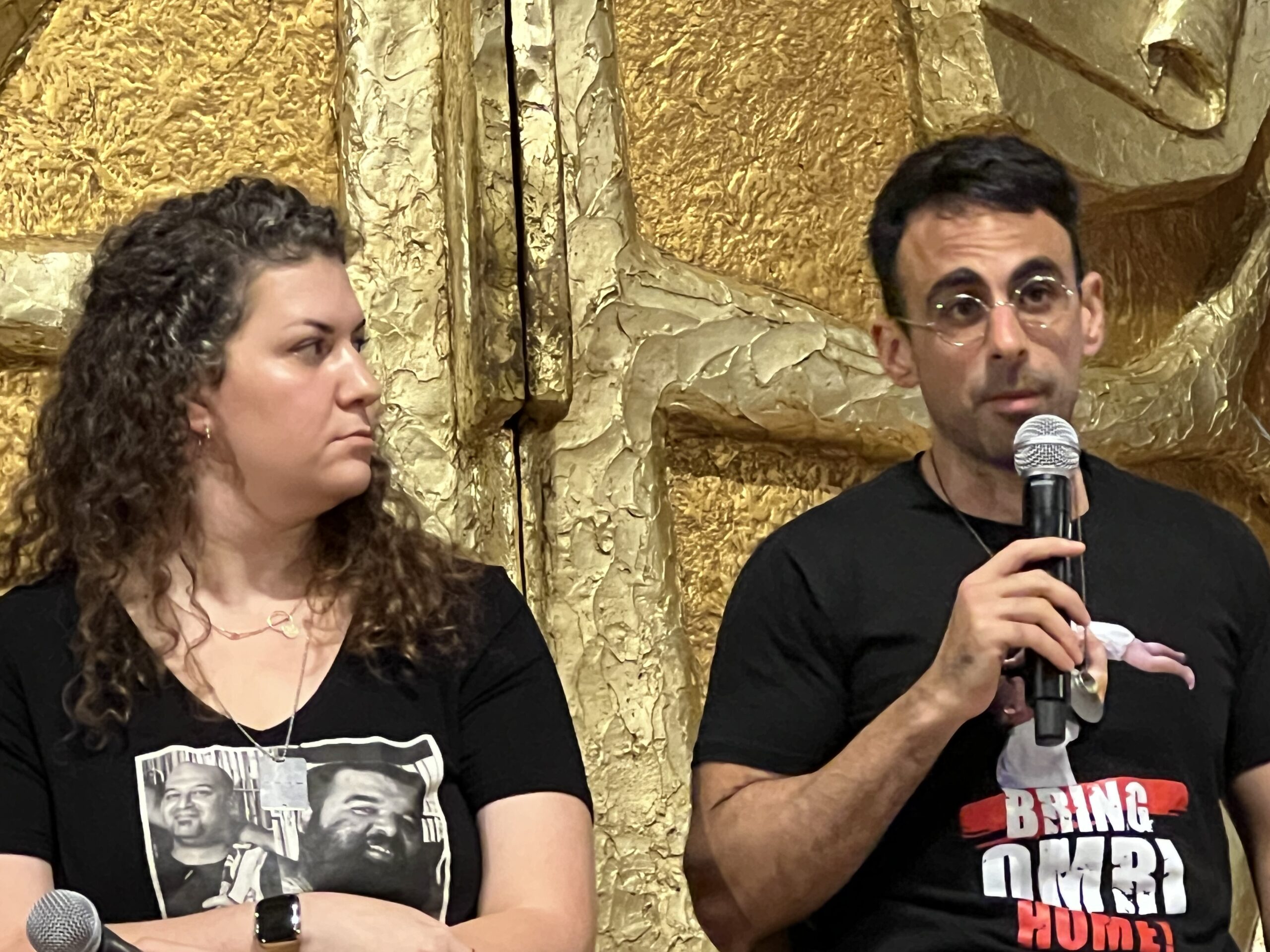Families of the Israeli hostages who were kidnapped during the Oct. 7 Hamas terror attack continue to advocate for their loved ones’ release. Recently, two of them spoke to about 50 people at Main Line Reform Temple, asking the audience to pressure their elected officials for help.
Hamas terrorists killed more than 1,200 people, raped women, and abducted 251 people, including five Americans, according to Israeli officials. More than 100 were released during a temporary ceasefire and prisoner swap in December. The Israeli military rescued four hostages last month, but a senior Hamas official told CNN that no one knows how many hostages remain alive.
Moshe Lavi showed a video of his 3-year-old niece, Roni, kissing a picture of her father, Omri Miran. Hamas terrorists kidnapped Miran from kibbutz Nahal Oz. Roni asks her mother, “’Why do you keep traveling, and you don’t bring my father back?’ The younger one, Alma, now 1, one of her first words was ‘Daddy.’”
Lavi, who graduated from the University of Pennsylvania’s Wharton School, said, “I was in a nightclub in Brooklyn, listening to music. I started getting notifications of rocket launches. Because I grew up in Sderot, I didn’t deem it important enough. It was normal for us…About 20 minutes after, it was clear it was different. Videos were emerging from my town, Sderot, of people in pick-up trucks shooting civilians.”
“My family texted me,” he said. He asked his family to keep him in the loop. But his sister, Lishay Lavi, stopped reporting in, and he assumed her cell phone battery died.
The terrorists invaded kibbutz Nahal Oz, “choosing who to kill, choosing who to skip, choosing who to hold captive for hours in their homes and eventually kidnap. There was no rationale for who was chosen. To be honest, if the terrorists were more efficient, they would have killed hundreds more.”
The “terrorists came to (his sister’s) home, using a teenage boy from the kibbutz to get them to open their door for them by asking for help,” he said. The terrorists later executed the boy.
“They were held captive. It was livestreamed on Facebook. And yet there are people who deny all this happened,” said Lavi. When the terrorists took his brother-in-law, Roni tried to run to her dad, but her mother prevented her.
“My sister told him she loved him, that she would take care of the girls and not be a hero. That was the last time she saw him,” said Lavi.
Hamas released a propaganda video of Miran in April.
“He doesn’t look well, but it gives us hope we can bring him home alive,” said
A Bala Cynwyd resident, Senderowitsch and her family are initially from Argentina, where they met Iair Horn. He was 16, and she was 8. Her parents worked with troubled kids, she said.
“He made Aliyah shortly after we went back to Israel.He would come to our house on break, for holidays. We were his family,” she said.
Senderowitsch was about to have her bat mitzvah in the kibbutz where her family lived in the Golan Heights, but she was sad that Horn would not be able to come. But her parents sent her to the bus station on the day of the ceremony.
“He was going through a rough time,” she said. “He’s usually a happy jokester. I didn’t know what depression was. I just wanted my big brother to be there.”
“I see Iair getting off the bus,” she said. “He came off the bus with a gigantic stuffed animal. He showed up there. He didn’t look good. I remember being concerned. But I was so happy. He was at the lowest of the low, and he took that time to make a 12-year-old girl happy.”
Eitan Horn, Iair’s brother, also made Aliyah and was a youth counselor.
“On Oct. 7, the missiles were raining down at kibbutz Mir Oz. Eitan (was visiting) Iair for the holidays…They go into their safe room. It’s insane. Everybody (there) has one.”
“We didn’t even know if they had been kidnapped for a long time,” she said. “When the second round of hostages was released in November, we found out they were in the tunnels…Everybody was being held in brutal conditions. We haven’t heard anything else.”
Lavi is often at the United Nations to plead for the hostages’ freedom.
“We’ve been advocating everywhere we can. In Israel. In the U.S. I know the Capitol here too well. We’re doing all we can,” he said. “We’re speaking to whoever is willing to listen.”
Senderwitsch and Lavi implored Americans to lobby for a peace deal.
“A deal is the only way to bring home the hostages,” said Lavi. “We need that pressure from the American Jewish diaspora on our politicians, as well.”
“I don’t need your sympathy. I’m sick of hugs. I need you to keep supporting communities and the families who were destroyed. You wake up in the morning, and instead of going to Starbucks and pay, for some reason, $7 for your coffee, just donate it. That’s a piece of clothing for my niece. That’s a meal for someone else.”
“We give speeches. We try to advocate everywhere we can,” he said. “Use your voices as citizens in a democratic country. You can call your elected officials every day…up to the White House…Tell your friends, tell your colleagues.”
Please follow DVJournal on social media: Twitter@DVJournal or Facebook.com/DelawareValleyJournal

